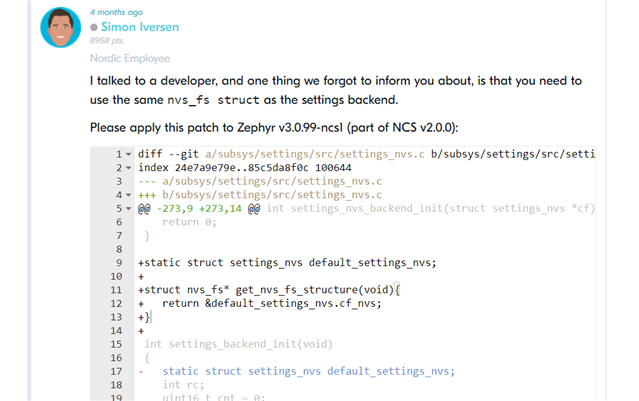I'm working on a project that uses BLE, NVS storage (for some serial number data and a few other variables) and littlefs, for storing log data that a client can then access over bluetooth via SMP. I'm on nRF Connect v2.0.0 and am using an nRF52832.
But I'm coming into some problems with making maximum use of the available NVS storage for my information. At the moment, this is how my static partitions are defined:
settings_storage:
address: 0x7a000
size: 0x2000
placement:
before:
- user_storage
region: flash_primary
user_storage:
address: 0x7c000
size: 0x2000
placement:
before:
- littlefs_storage
region: flash_primary
littlefs_storage:
address: 0x7e000
size: 0x2000
placement:
before:
- end
region: flash_primary
Ideally, I want to maximise the amount of littlefs storage, and reduce the settings and user storage to an absolute minimum. But the user_storage needs at least 2 sectors, each of 4kB (a page) in size, even if I only need to store 200 bytes of info. Similarly, it seems the settings area needs a similar amount as a minimum, because the moment I try and reduce that, my BLE functionality stops working. This is only leaving me 8kB of littlefs storage.
Reading this, it seems its possible to combine the settings and user storage areas into one, which potentially would free up 8kB. But I don't believe this has been implemented in v2.0.0, so I may need to upgrade to a newer SDK (I think its available in v2.1.2). Question I have though is how do I actually implement this in my code? I've just followed the nvs example to set up my user storage in my code, so it looks something like this:
static struct nvs_fs fs;
int16_t flash_initialise(void)
{
int16_t rc;
fs.flash_device = FLASH_AREA_DEVICE(STORAGE_NODE_LABEL);
if (!device_is_ready(fs.flash_device)) {
printk("Flash device %s is not ready\n", fs.flash_device->name);
return -EINVAL;
}
fs.offset = FLASH_AREA_OFFSET(user_storage);
rc = flash_get_page_info_by_offs(fs.flash_device, fs.offset, &info);
if (rc !=0)
{
printk("Unable to get page info\n");
return rc = -EINVAL;
}
fs.sector_size = info.size;
fs.sector_count = NVS_SECTOR_COUNT;
if(fs.sector_size*fs.sector_count > (FLASH_AREA_SIZE(user_storage)))
{
printk("ERROR: Area used by NVS is larger than user storage\n");
}
rc = nvs_mount(&fs);
if (rc !=0)
{
printk("Flash Init failed\n");
return rc;
}
}
Note that STORAGE_NODE_LABEL = settings_storage.
Alternatively, this seems to be indicating its possible to combine nvs and littlefs partitions into one. It doesn't really elaborate on how to do this though. Is this an easier option than trying to combine settings and user storage?
Are there any other approaches I can use to reduce the amount of flash taken up by the settings and user storage, and hence maximise the amount of littlefs storage space I have?
Cheers,
Mike


